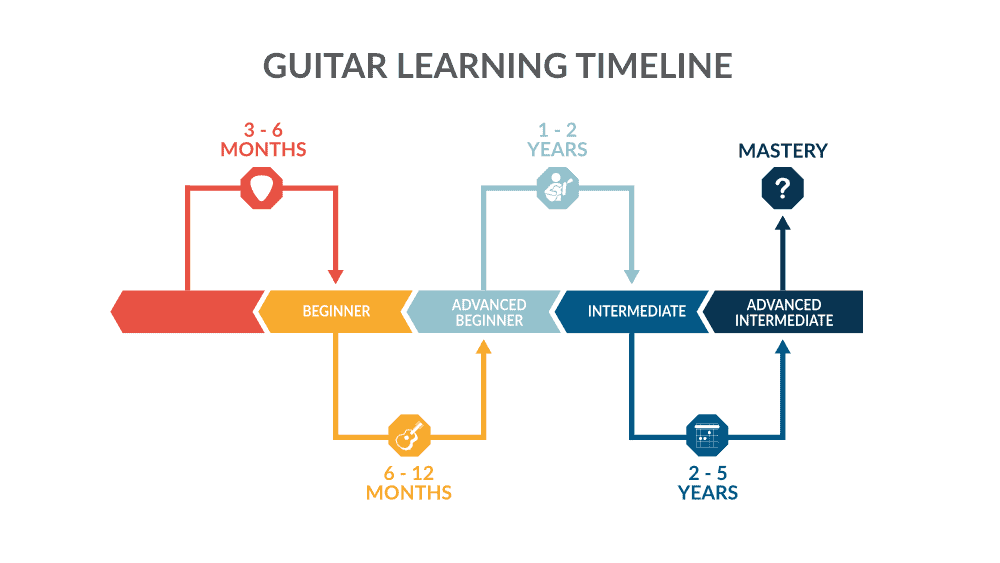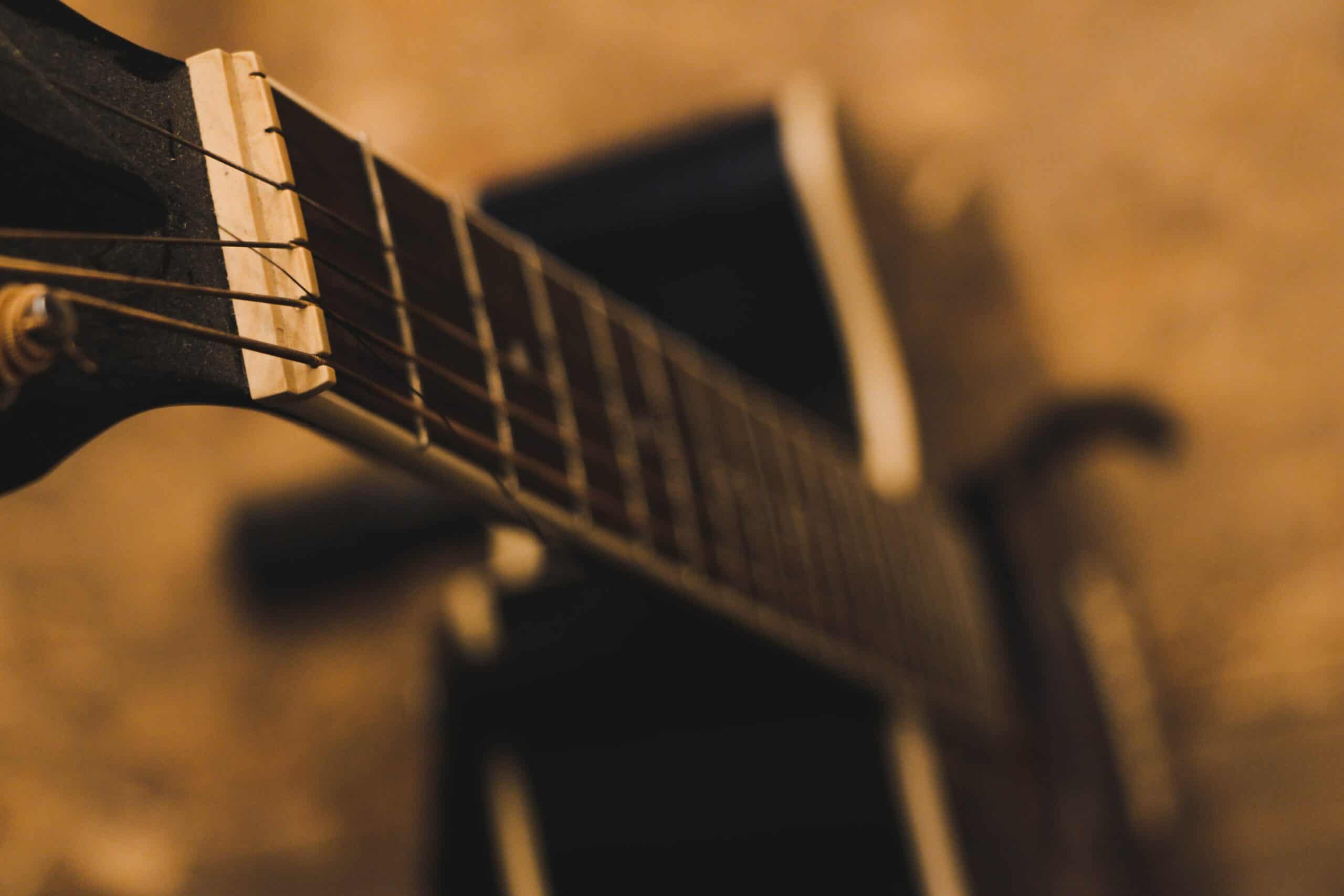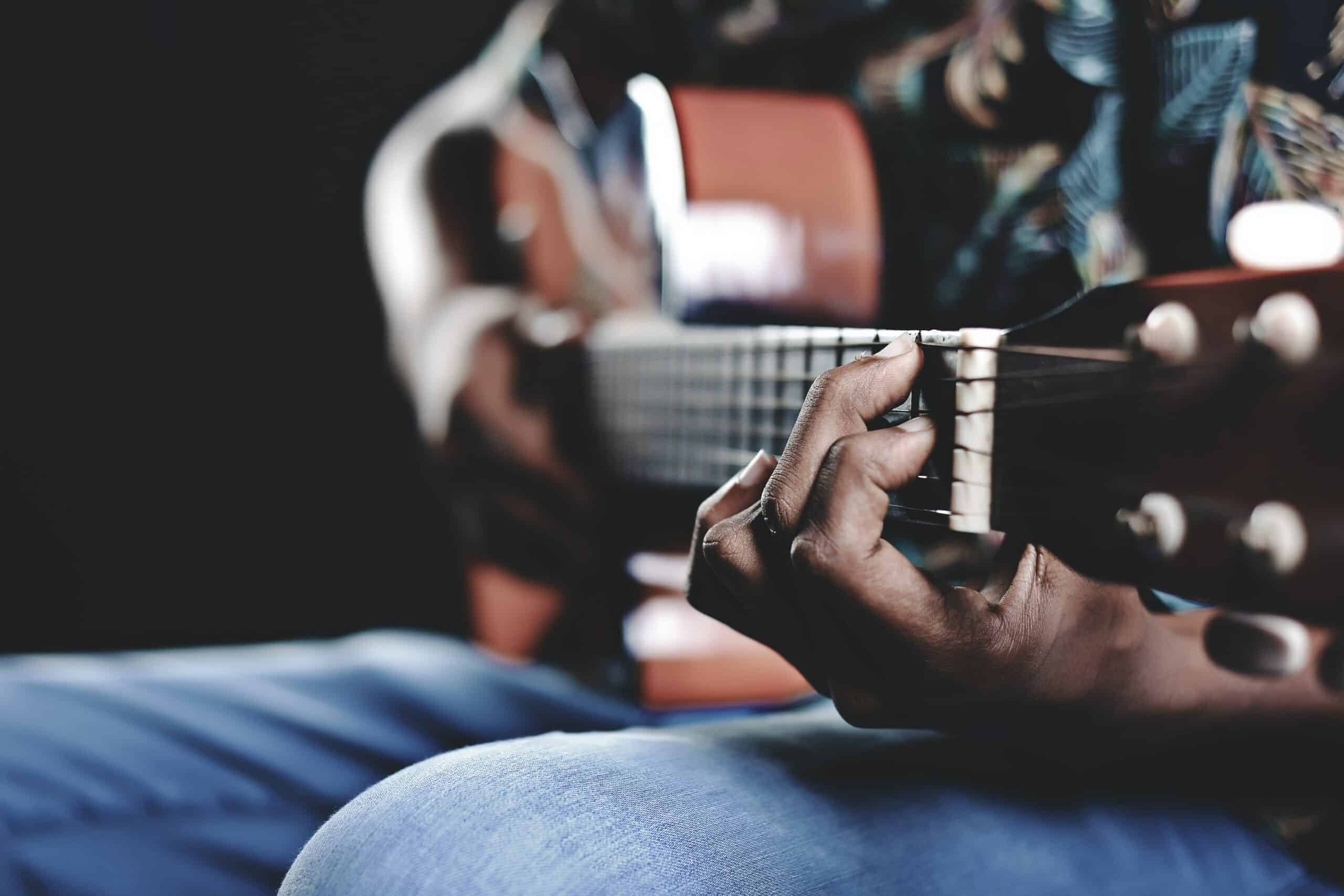A lot of my guitar students have asked me the same question over the years - "How long will it take for me to get good at guitar?". This is an ambiguous question, which makes it really difficult to answer.
It's understandable for new guitar players to ask this, heck, it's even human nature to want to understand exactly what you're getting into and to know that you can do it beforehand and that it will be worth putting in the effort.
There is no one clear-cut answer on how long it will take for you to get good at guitar, as everyone's idea of "good" is different from each other. Instead I have provided you with a rough timeline below on what to expect at each phase of learning guitar.
How Long Will It Take To Learn Guitar?

It goes without saying that everyone is different. We all pick things up at different paces, and we all have different amount of time to put into the instrument. If I can give you a piece of encouragement, remember that Eddie Van Halen, Jimi Hendrix, Stevie Ray Vaughn, and any guitar hero that you have all started right where you are now.
“When will I be able to play something?”
This is another common question, isn’t it? After all, we all start to play guitar because we want to play songs! Here’s what you can expect a typical timeline to look like. I've broken it out into a few timelines, but keep in mind that everyone is different.
Beginner Phase: 3-6 Months
From my experience, most students will be able to play things they feel good about in 3-6 months. This is also the time where you might realize it’s harder than you thought. You’re building calluses, developing hand strength and coordination, and learning many of the fundamentals that will help you learn more advanced techniques.
Many students unfortunately lose interest at this point. The ones who don’t have a good energy that carries them through to the next phase.
Advanced Beginner Phase: 6 months to 1 year
After the beginner phase you might start to feel like you’re not progressing as much. When you first learn guitar everything is new so you’re learning a lot. You can see good progress almost daily. After the first 6 months or so you’re still learning, but your standards are now higher and you’re working on more complex techniques. This is your first plateau you’ll experience in your journey (it wont be your last).
That initial excitement about learning guitar might wear off a little. While it might not feel like you’re progressing, you still are. The increments are just smaller than they were a few months ago. This is another place where some students quit. However, the ones who stick with it are rewarded with another growth spurt in the next phase!
Intermediate Phase: 1-2 Years

I like to call this phase the “buckling down” phase. It’s a period of buckling down with your nose to the grindstone. And it’s finally at this point where you realize that the question of “how long will it take to learn guitar” is fairly useless. If you’ve been practicing regularly you’ve been picking up new skills and refining your playing. You’ve been looking forward so much that you might not realize how far you’ve come.
You’ve learned most or all of the open chords, even barre chords. You can change smoothly between chords, and in general playing guitar feels comfortable and natural. You may know a few scales and feel comfortable playing melodies. You’re also painfully aware of how much more there is to learn, and you can see where your areas of improvement are.
Advanced Intermediate Phase: 2-5 Years
At this point in your guitar playing you’ve got everything you’ve learned so far down pat. You scoff at barre chords (they’re super easy now), your strumming is smooth and you have a good sense of rhythm. You chord library keeps growing with new and exciting chords. You’ve developed good techniques and you play with confidence. You can probably play a large number of songs from memory. You might even be in a band!
If you’re into playing lead guitar you might have started to work on improvisation. You likely know more in your head than you can put into practice. This creates a little bit of ongoing tension, but that will work itself out over time and with more experience. You have a much better idea of what you don’t know yet, and you might have decided to learn a specific genre on guitar (like Jazz, Classical, and so on).
A shift happens here. You move on from constantly wanting to learn new things, to working to improve on the things you already know. When you first started to learn guitar practicing may have felt like a chord, but now you see the value in practicing your foundational skills and working to improve them. If you had the chance to go back 2-5 years in time and see yourself now, you’d consider yourself to be “good” at guitar. But now you have a deeper understanding and a new perspective. You’re aware of how much more there is to learn and “good” doesn’t mean much to you.
You’ve realized that guitar is a journey, that learning and practicing are a way of life. Not just a means to an end. You look forward to the new things that you’ll learn and they music that you’ll make. Guitar is a joy to play and practice (most days anyway). This journey isn’t just a hobby, it’s added another dimension to your life.
What Matters Most When Learning Guitar

I think it was Tony Robbins that said that the questions you ask guide your focus. I’ve come to see the value of this in my own life. Asking better questions gets you better results. Asking “how long” shifts your focus from things that will help you become a better guitar player.
Time doesn’t say much about your progress. Sure, the amount of time you practice will have a direct impact on your progression. But it leaves out what you practice. Instead of asking “how long...” you could ask “how do I get better at barre chords”, or “what should my practice routine look like”. These are tangible questions that you can take action against. And they’re much easier to measure your growth by.
I think this whole idea of being “good” at guitar naturally leads to comparing yourself to other guitar players, or some arbitrary standard that may or may not apply to you. Goals are fantastic to have and strive to, but comparisons aren’t very helpful.
I’d love to know what you think about all of this, and what questions you think will make you a better guitar player. Let me know in the comments!
If one of your questions is about what to practice and where you should spend your time, get a free Guitar Success Checklist. After answering a few short questions you’ll get a personalized report with recommendations of where to spend your time to get the most bang for your buck.
Add To Pinterest


